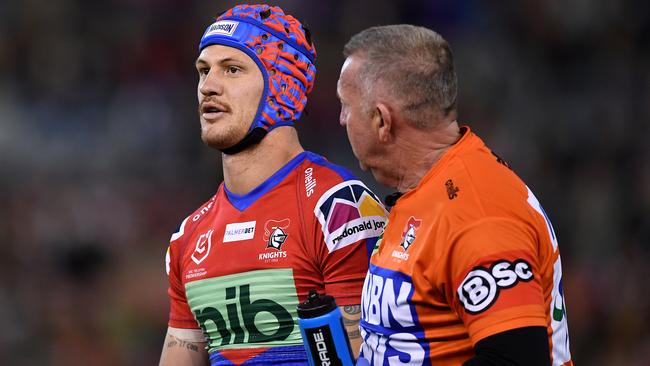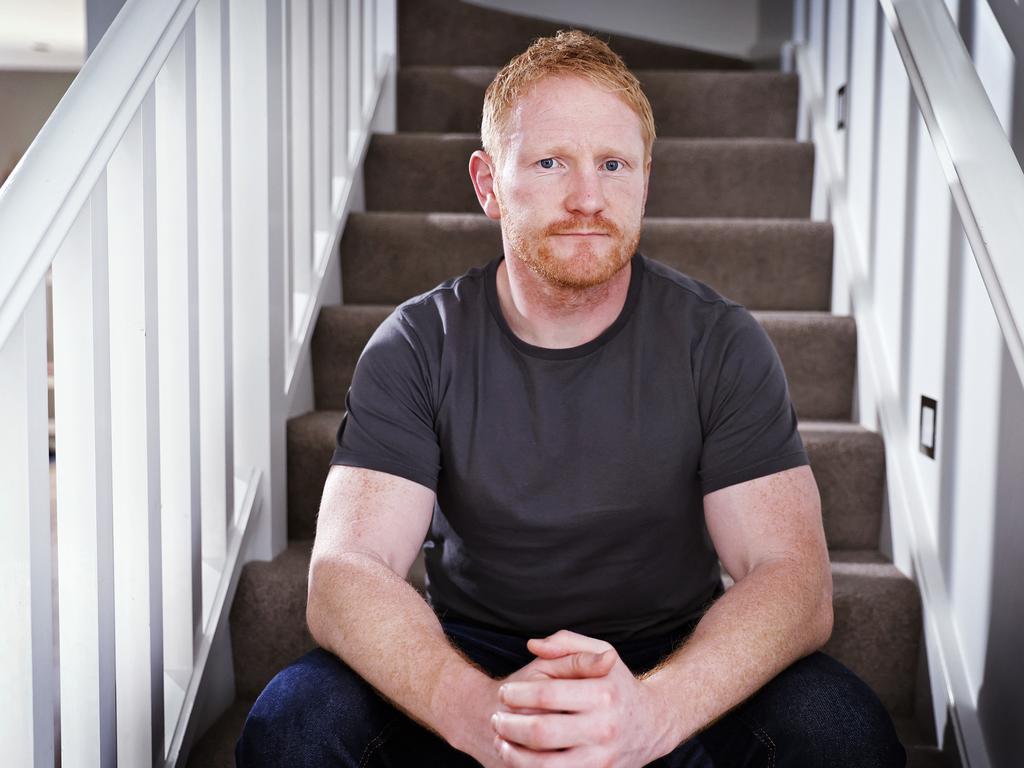NRL to consider mandatory one-week standown for concussed players
The NRL are preparing to debate the merits of a mandatory stand down period for concussion.

The NRL is set to debate an automatic one-week stand down for any player that suffers concussion, among tough new measures being considered to increase safety.
High-tech mouth guards and ‘Nurochek’, a device designed to measure the brain’s electrical activity to help diagnose concussions, are also being looked at by NRL leaders.
The NRL declined to comment but it is understood a subcommittee on concussion will be formed on how best to manage the biggest issue in the game.
Already in the UK’s Super League, a player who fails an HIA during a game or at training is not permitted to engage in that activity again for a period of 11 days.
The same rules applied in last year’s Rugby League World Cup.
A mandatory stand down for concussion could result in players being ruled out of crucial games – in last year’s NRL finals series Souths captain Cameron Murray and Parramatta star Mitchell Moses suffered notable concussions but were included in their respective teams the following week.
This week a federal parliamentary inquiry into concussion in sport heard evidence from leading neurologist Dr Rowena Mobbs.
Dr Mobbs called for sporting bodies to sideline concussed athletes for a minimum of four weeks.

“Four weeks is my recommendation as well as a graded return-to-play protocol in those with symptoms beyond this point,” Dr Mobbs told The Weekend Australian. “It would be wise to take a more conservative approach given the potential for delayed symptoms and the mounting evidence of brain abnormalities well beyond two weeks in some players. A four-week benchmark seems reasonable. In my clinical practice that is what I encourage.
“We need to allow a player’s brain time to recover away from the pressure of competition, and a sporting body should have an open mind to allow an athlete further time if they need it.”
Dr Mobbs, who has cared for the likes of Souths legend Mario Fenech, who has been diagnosed with probable CTE, said it should be longer for junior athletes.
“For kids, it should be longer, and there‘s talk of six weeks,” Dr Mobbs told the inquiry. There was also talk, 30 years ago … ‘if you have two concussions in a season, perhaps you should take that season off.’ These are to be debated among the appropriate organisations, and independently so, but I would advocate that paediatric neurologists and adult neurologists should be involved.”
Dr Mobbs used her appearance at the inquiry to make several recommendations to the federal government to “instigate revised and regularly reviewed guidelines into head and neck injury in sport”.
NRL great James Graham also spoke at the Senate inquiry this week and again called for the NRL and other codes to implement a brain/body/mind check up for retired players.
“The solution that I believe would create so much positive change would be an annual brain, body and mind check-up for retired athletes. There would be no unintended consequences for bringing this in.”
Graham, who hosted The Australian’s chart-topping investigative series Head Noise, called for sporting bodies to use more technology to diagnose concussion.
“I understand why players would elect to continue on despite the fact that they likely know they’re concussed,” Graham told the inquiry.
“But if a saliva test, urine test or blood test were to diagnose a concussion, then it’s completely out of my hands; I have no choice.”
The inquiry is due to report its findings on June 21, which coincides with game two of this season’s State of Origin series.
Reduced contact in training, called for by the likes of Roosters captain Luke Keary, is set to be raised as a possible measure to limit head knocks in the NRL.
The Roosters five-eighth sustained five concussions between January 2018 and May 2019.
Keary last year said the NRL was lagging behind football codes such as the NFL when on training mandates. “We should have had less contact five years ago,” Keary said. “They do it in the NFL. I don’t know how we haven’t done those studies and tests … I just don’t know how it hasn’t happened.”
The NRL recently announced that this season concussion substitutions would be available after two players fail HIAs, rather than the previous threshold of three.
Last year rugby union chiefs in the UK were hit by a concussion lawsuit taken on behalf of nearly 200 players with brain damage.
Rylands Legal issued proceedings on behalf of professional and semi-pro players against World Rugby, the Rugby Football Union and Welsh Rugby Union.
In October 2022 a legal claim against the Rugby Football League for negligence was launched on behalf of 80 former players.
They say the RFL did not “take reasonable action to protect players from permanent brain injury caused by repetitive concussive and sub-concussive blows”.
Former Great Britain halfback Bobbie Goulding, along with 10 other former rugby league players, previously claimed the sport left them with brain damage.
Goulding has been diagnosed with early-onset dementia.








To join the conversation, please log in. Don't have an account? Register
Join the conversation, you are commenting as Logout